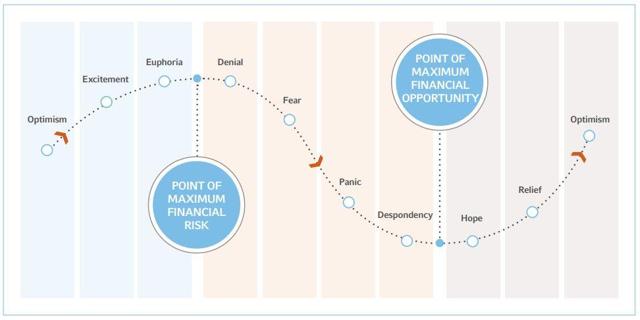I expect that most serious investors (meaning, my
readers) are well aware of market cycles. And often, how they feel about
the market also runs in cycles. This chart, “The Market Cycle of Emotions”, best illustrates and identifies how investors may be feeling during points of the market cycle.
(Source)
A
few weeks ago, I was reading comments on Seeking Alpha, and one of my
valued readers, RoseNose, said she was “hoping” for the best. As Richard
Russell wrote in one of his Dow Theory letters...
“Any time you find yourself hoping in this business, the odds are that you are on the wrong path - or that you did something stupid that should be corrected.”
“I have seen a lot of hopes ending in disasters simply because people made mistakes in buying bad businesses or expensive stocks, and then hoped that a tooth fairy would absolve them by taking the prices higher!...
“Unfortunate it may sound, but hope is a big money-loser in the investment business. It is hope that keeps you from selling your losing stocks. It is hope that stops you from cutting your losses before they get bigger. It is hope that leads you to buy good businesses at super-expensive prices.”
Khandelwal adds:
“But please... please don’t HOPE! Avoid it! Instead, embrace patience and reality... however painful it may be. And finally remember this - there are many good investing strategies: buying cheap stocks, buying high quality businesses, turnarounds, top down, bottom up, to name only a few. Hope is not among them.”
As a true “value investor”,
I’ve learned to take the emotion out of the investing process, and
instead, rely on data and reasoning. That’s not to say I don’t embrace
my “gut feelings” for a stock - after all, I minored in psychology (over
25 years ago), while majoring in business (at Presbyterian College).
However,
fundamental analysis is the best strategy for me, and it’s one that
allows me to take the guesswork out of the investing process. “Hope” is
not part of my vocabulary. As Benjamin Graham said:
“Most of the time common stocks are subject to irrational and excessive price fluctuations in both directions as the consequence of the ingrained tendency of most people to speculate or gamble... to give way to hope, fear and greed.”
My SWAN Strategy
Many of you on Seeking Alpha are aware of my SWAN strategy, and of course, the acronym that stands for “sleep well at night”.
I
certainly did not coin the term SWAN investing, but I am certainly a
disciple of the method of analyzing stocks using fundamental analysis.
After all, from a value investor’s perspective, “You are neither right
nor wrong because the crowd disagrees with you. You are right because
the data and reasoning are right.”
As far as I’m
concerned, SWAN investing boils down to minimizing risk, and every
investor should use his or her set of principles to form their own
philosophy. While it is impossible to eliminate all investment risk,
value investors can greatly minimize risk by filtering out the
disadvantageously positioned companies from the outset.
It’s
important to take the emotion out of investing and not rely on hope,
panic, or optimism to form an opinion. Value investors have the extra
security of knowing that they own quality stocks that have one or more
attributes of long-term winners.
That’s the primary
reason that my SWAN strategy has proven to be successful. While I wish I
could claim that my basket of SWANs have outperformed year to date, I
can say that my long- term success is rooted in selecting REITs with a
significant margin of safety.
In other words, if I do a
good job at screening the best SWANs, I am less concerned with the
behavioral aspect (i.e., hope, panic, etc.). In fact, I can use this to
my advantage - when I see fear overblown (i.e., rising rates and retail
apocalypse), I sharpen my pencil and scout for the very best SWANs,
recognizing that at some point “the storm will subside, and a sunnier
and more plentiful time is bound”.
Always remember,
the present price is based on a mix of unpredictable factors, many of
which pertain more to the market cycle of emotions, so it is virtually
impossible for anyone (even RoseNose) to predict future prices
accurately.
It’s the job of an Intelligent REIT
Investor to capitalize upon “a favorable difference between price on the
one hand and indicated or appraised value on the other”. When asked
what keeps most individual investors from succeeding, Benjamin Graham
had a concise answer:
“The primary cause of failure is that they pay too much attention to what the stock market is doing currently.”

No comments:
Post a Comment